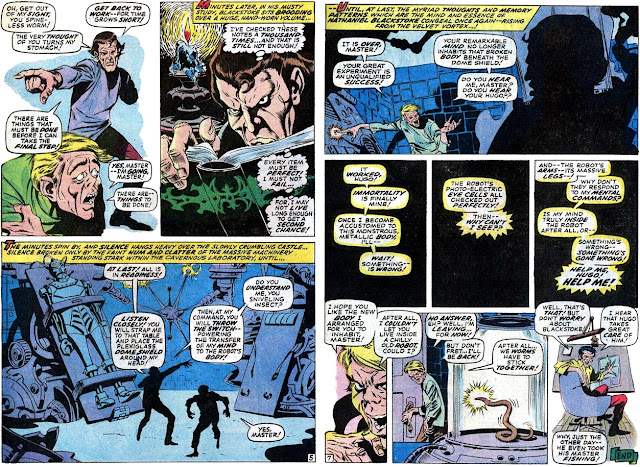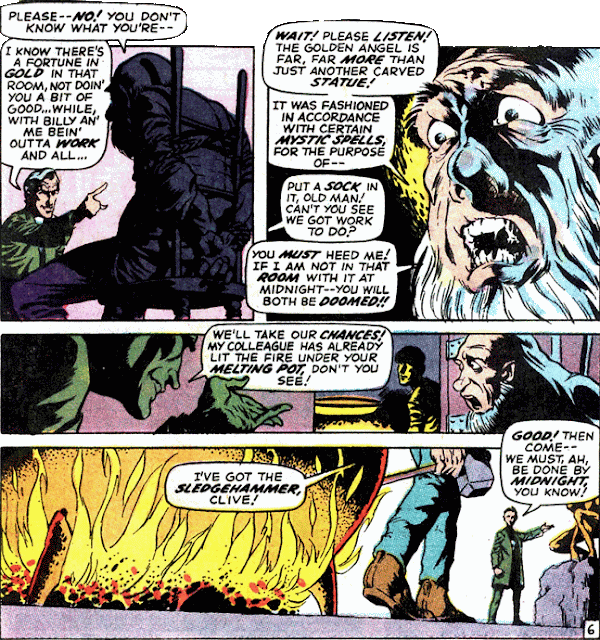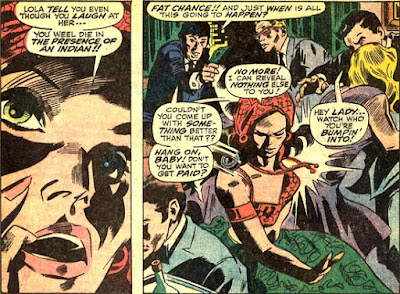Perhaps eyeing the success of the DC horror/fantasy anthology titles House Of Secrets and House Of Mystery, Marvel launched two similarly themed books in late 1969: Tower Of Shadows and, one month later, Chamber Of Darkness. Like their DC counterparts which were published on a bimonthly basis (off and on), both Tower and Chamber hit the stands every other month--but it seems the similarity ends there in terms of sales, as Marvel's offerings sold poorly and were discontinued after ten and eight issues, respectively. Tower, premiering first, seemed somewhat better received by readers, judging by letters page response, though the ratio of raves to more critical assessments appeared to be about 30/70. There was also the question of sustainability, as both series began pulling in reprinted material from their earlier anthology titles from the '50s-'60s (Strange Tales and Tales Of Suspense) with their sixth issue.
Suffice to say that DC's House titles were in no danger of readers jumping ship for Marvel's offerings--though it wasn't for lack of trying on Marvel's part, at least initially, as some of the company's most notable talent were tapped to contribute stories. Roy Thomas, Jack Kirby, Stan Lee, John Buscema, Gene Colan, Len Wein, Marv Wolfman, Jim Steranko, et al. (including John Romita Sr., who mostly did cover work) were seemingly able to accommodate seven-page assignments (or less) within a two-month window (though I believe Steranko withdrew after only one story, reportedly due to a disagreement with Lee)--with some artists even pulling double duty and contributing scripts as well as art, in addition to inkers providing readers with examples of their own pencils.
After their all-too-brief runs, each title shifted to formats made up of almost entirely reprinted material, in addition to adopting new mastheads. Tower became Creatures On The Loose, which mixed its reprints with sword and sorcery tales as well as a regular feature on Man-Wolf, while Chamber morphed to Monsters On The Prowl--each book having a run of 30 to 37 bimonthly issues (the creatures pulling ahead of the monsters--make of that what you will). But since there's a little more ground to cover with both Tower and Chamber, and having already examined Jack Kirby's stories in the latter, let's turn to a few samples from some of the other names we've mentioned who made their mark in the macabre during the brief time when these two titles were being published.
Artist John Buscema would mostly work on Tower, but I was partial to his tale in Chamber which involved a young teenager named Tommy, who, attracted to both wealth and power, awakens a sleeping djinn and gets more than he bargained for. Will his blunder into the supernatural mean the death of all mankind?
Quick (if desperate) thinking on Tommy's part, averting disaster. And while we're on that subject, Roy Thomas's "The Day Of The Red Death," adapted from Edgar Allen Poe's 19th century short story "The Masque Of The Red Death" and drawn by artist Don Heck, turns its focus on society's elite as they retreat to a bunker following an outbreak of a deadly gas that has doomed the human race. Among them is George Harris, their sanctuary's designer, who is the odd man out in this tale--but not for long.
To lift their spirits and relieve their boredom, this self-centered group decides to hold a somewhat tasteless masquerade party where they revel in their good fortune and the misfortune of those outside who fell victim to the gas. But just as in Poe's story, a mysterious figure arrives as the personification of the deadly gaseous plague--quite literally so, as the guests discover to their horror.
Next, inker Tom Palmer, whose pencil work at Marvel is rare, demonstrates his talent in that regard in a tale of a man whose treatment by his abusive uncle drives him to take drastic action in a night of both horror and, as strange as it sounds, opportunity.
And then there's Barry Smith, whose work on Conan The Barbarian was at this point in time still six months away but who was already sharpening his sword pencil in this tale of an author whose fictional creation unexpectedly takes a stand against the fate his creator had planned for him.
Well before their collaboration on Incredible Hulk, Len Wein and Sal Buscema teamed up to tell the story of a mad scientist who bullies his assistant into helping him achieve immortality. (Though if these scenes remind you of the relationship between Magneto and his cringing lackey, the Toad, join the club.)
Of course no horror anthology would be complete without the work of Bernie Wrightson, who introduces us to Emil Vogel (these character names often seem like they could be anagrams, don't they?), a sculptor who notes with dread the recent murders in his village and wonders how long it will be before the constabulary regards him as a suspect.
Someone else is interested in Emil's shop, however--two opportunists, who have their sights set on all of that gold in Emil's "golden angel" and who forge ahead despite Emil's dire warning to them. But they learn to their shock that their actions have indeed doomed them, and, more than likely, their fellow villagers.
What I said about Wrightson goes double for artist Tom Sutton, whose praises the PPC has already sung but who appears to take particular delight in plying his craft in outlets such as Chamber or Tower and seeing that a character receives their just deserts. In this case, the lucky party happens to be another mad scientist, who rejoices in his new creation's first steps--until those steps bring the newly independent Manaak in his direction.
If this next story seems familiar to you, it's because it was originally written and presented by Jack Kirby three issues prior (and covered in the prior post). This time, its new title seems apt, considering the rationale offered by writer Bill Everett as to why he's recreating it. I'm more inclined to be receptive to the "remarks" of artist Dan Adkins, as to the intriguing aspect of another writer/artist team offering their take on a prior story--a sort of "what if" approach that takes the form of a story being handled by a different creative team, as opposed to an alternate tale that has its characters making different choices.
I don't know--the other side of that wall looks none too peaceful or even hospitable for our Mr. Boone. And sayyyy... doesn't his intangible benefactor's outfit look like the disguise the Vision was using in a separate post?
Over in Tower, where John Buscema was turning in work along with Wally Wood, Neal Adams, Johnny Craig, et al., it was there that Gene Colan's contributions to this genre could be found--such as this tale by Marv Wolfman concerning Michael Royal, a ruthless businessman who doesn't hesitate to stab even a friend in the back. So it probably goes without saying that a warning from a fortune teller predicting his imminent death isn't going to do much to faze him.
But Royal's dismissal of his predicted fate instead turns more progressively toward worry and nervousness from then on, as he is witness to a series of near-fatal accidents which in one way or another involve an Indian motif--until, finally, there is no escape.
Which seems as good a place as any to, er, drop our recitings of these tragic events and leave most of these people to their fate, while commending those who ended up taking a different path. Out of curiosity, though, who among you became readers of the spinoff Creatures and Monsters titles?




























Some absolutely gorgeous art in those! I was a little surprised how much I enjoyed the combination if Sal Buscema and Syd Shores. Tom Palmer is usually cited as Gene Colan's best inker, but Shores worked really well with Gene the Dean too.
ReplyDeleteAlso, that's the only time I ever recall seeing Marv Wolfman credited as Marvin!
I'm with you on Shores, Dave--I don't think I've ever been disappointed in his work.
ReplyDeleteI’m only aware of these titles because the characters Digger and the West Coast Avengers version of the Hangman first turned up here.
ReplyDeleteSo another Halloween is upon us, I see, from the offerings in PPOC!
ReplyDeleteThis stuff is new to me, and not bad for horror comics, at least to a guy who grew up with Charlton. These are a lot slicker, that's for sure.
So Stan the Man is a horror host now! He does kinda look like Dr. M.T. Graves. Or maybe his evil brother.
I enjoyed the Buscema story too, C.F., and Don Heck never looked better to me than here. He gets a bad rap.
It looks like Marvel was taking a serious crack at this genre, but maybe they were spread too thin already by this point, methinks.
M.P.
Don Heck has surprised me from time to time as well, M.P. He does pretty well at setting a scene in addition to giving a plot its legs so that it plays out reasonably well from page to page. Tower and Chamber might have been a nice niche for him as a regular assignment, had they lasted.
ReplyDelete
ReplyDeleteSal's early work at Marvel was outstanding, especially when inked by Shores. It eventually turned into hackwork, in my opinion. These books were a lot of fun, though. So much talent on display.